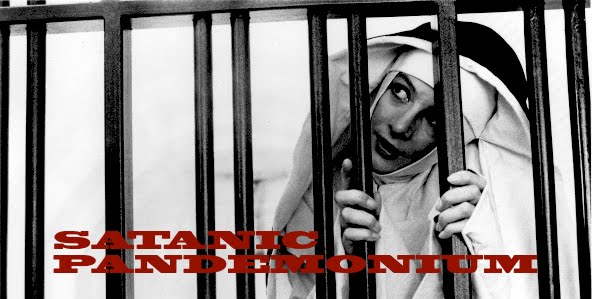Jim O’Connolly, 1967
Starring: Joan Crawford, Judy Geeson, Ty Hardin
A traveling circus in Europe is prey to a number of tragedies — beginning with a tightrope walker falling to his death — before it becomes clear to Scotland Yard and to the circus owner, Monica Rivers, that a madman is loose under the big top. Suspects include Rivers herself, who has profited off the first death by taking advantage of media attention, as well as the Great Hawkins, a guarded, sometimes violent man who has convinced Monica to give him a starring role as the new tightrope walker, and various other squabbling members of the circus, all of whom seem eager to stab each other in the back. Tensions increase further when it becomes obvious that Rivers and Hawkins have begun a romantic relationship, despite the fact that she is much older than he is, and when her young daughter is thrown out of boarding school and joins a circus act with the knife thrower...
It’s amazing to think that Joan Crawford’s final two film roles were in British horror films (Berserk and Trog, which I will explore at a later date), while her last really great role is in Robert Aldrich’s slightly earlier 1962 film Whatever Happened to Baby Jane? That film costarred Crawford’s archnemesis, Bette Davis, who coincidentally also wound down her career with a number of truly fine (and some very over the top) performances in genre films: Hush… Hush, Sweet Charlotte (1964), The Nanny (1965), the completely bonkers The Anniversary (1968), Burnt Offerings (1976), and, my personal favorite, The Watcher in the Woods (1980) — among others — outdoing poor Crawford once and for all.
But ironically, when I think of Crawford — and my favorite of her films — I think of circus horror, namely Tod Browning’s 1927 film The Unknown, where a very young Crawford stars alongside Lon Chaney in my favorite of all his performances. Berserk is admittedly a world away from The Unknown — that film being a sort of precursor to body horror as Chaney plays an allegedly armless knife thrower — and has far more in common with campy British films like Circus of Horrors (1960) and The Black Zoo (1963), though Berserk horrifyingly spends much of its running time filming the circus performances themselves, possibly in an effort to pad its weak plot. At first I found this really annoying, but by the time the film shoehorned in what is maybe the eight of these (a “death defying” elephant show), I was just weak with laughter.
I think it’s probably all about your tolerance level and managing expectations, as Berserk is short on violence, short on gore, all but devoid of sex (though some is lightly implied) and nudity, and has a plot that barely goes through the motions. But it is not light on Joan Crawford — who prances around in a leotard and high heels while in her 60s — and for this, I have to love the film at least a little bit. I tend to be a bigger fan of actors than actresses from classic Hollywood, but I’ve always admired Crawford for her weighty presence, her seemingly innate sense of campiness, and the sheer force of will that made it seem like nothing was ever impossible, she just had to set her mind to something to make it possible. She may lack some of Bette Davis’s subtlety or range (sorry Joan), but there was really no one quite like her. Few actresses, then or now, could convincingly pull off a relationship with a much younger man (not that the bland Ty Hardin does her any favors) at 60+, and there’s a particularly great scene where she tells Hawkins that she’s not interested in anything more than a physical relationship and basically laughs in his face about the suggestion of love.
For me, the film’s biggest disappointment is that — SPOILER ALERT — Crawford is not the killer. I generally prefer her at her most insane, as in the glorious film noir, Possessed (1947), but there is a (perhaps intentional?) riff on Crawford’s notorious reputation as a mother from hell. The film’s killer is, completely implausibly, Rivers’ sweet and innocent daughter (played by the wonderful Judy Geeson, who I am a little bit in love with thanks to her performances in films like Goodbye Gemini, 10 Rillington Place, and Fear in the Night), who is so desperate for her mother’s love that she snaps. Allegedly Christina Crawford was considered for the role (her mother refused), which is one of the best things I’ve ever heard.
In general, the film is overwhelmed by female characters, despite some solid appearances from Michael Gough as Rivers’ hapless business partner and Robert Hardy as a Scotland Yard detective. Hardy, who seemed destined to play a figure of authority and had a presence in horror and thriller films from the period, such as The Spy Who Came in From the Cold (1965), Psychomania (1971), and Demons of the Mind (1972), nearly steals the film out from under Crawford. Nearly. One of my least favorite actress of all time, Diana Dors, is allowed to be particularly terrible here, and has the best death scene in the form of a magician’s trick, where she is accidentally sawed in half.
Berserk is one of those films that I’m not sure I should recommend, but I have a strange compulsion to do so. You can find it on DVD, though anyone who expects a lot from their circus horror should keep in mind that this is a far cry from Freaks — brace yourself for the music number — but it’s really worth watching just for some of Crawford’s dialogue, like “I’m not running a charm school.” I love her and I’m not sorry.


No comments:
Post a Comment